poisonous
Showing 13–24 of 28 results
-
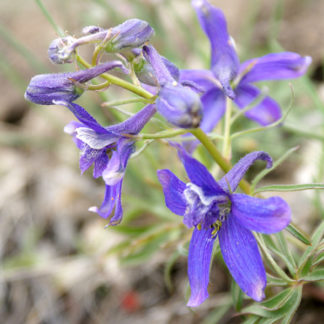
Delphinium bicolor / low larkspur
- short plant with a spike of purple flowers
- individual flowers have a pronounced spur out the back
- leaves are few, round, deeply lobed, about the size of a quarter
- widespread throughout the valley and on the hills
- appears and blooms soon after snowmelt
-

Delphinium x occidentale / tall larkspur
- white with blue center, long white spur (tail) out the back
- flowers on tall racemes, up to 6 feet - more than 50 per stalk
- highly divided/lobed leaves
- flowers look a lot like garden larkspurs
-

Helenium autumnale / common sneezeweed
- 2" flower head with nearly spherical central disk; numerous yellow rays
- found in moist areas in full or partial sun
- sessile or clasping lance shaped leaves on an angled and winged stem
-

Hyocyamus niger / black henbane
- highly toxic! including contact dermatitis
- 5-lobed, funnel-shaped flowers, brownish yellow with purple veins and center; 1.5" across
- flowers in summer, e.g. warm June, July
- elliptical leaves, pointy tips, toothed or lobed margins, prominent veins
- highly disturbed areas: wastelands, field edges etc.
-
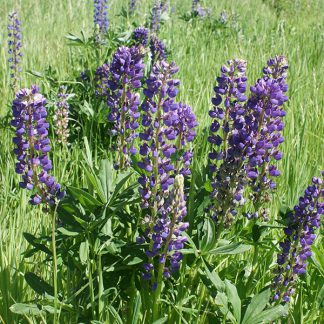
Lupinus spp. / silvery and silky lupins
- palmately compound, usually silvery-green leaves
- 5-9 leaflets per leaf; long petioles
- flowers on long, spikey racemes, blooming from bottom upward
- numerous flowers, but all rather teeny; most purple or blue
- flowers are above the leaves
- seeds in short, hairy pods
-

Phacelia sericea / silky phacelia
- deep purple flowers with really long stamens and orange anthers
- many flowers arranged in a tight coil up to 2 feet long
- silky, divided (fern-like) leaves
- exposed, higher altitude, rocky places; often with sagebrush
-

Prunus virginiana / western chokecherry
- oval leaves with serrated margins and abrupt taper at tip
- reddish twigs with prominent lenticels
- drooping clumps of white flowers w/ yellow centers in spring
- red to black cherries in fall, up to ½ inch diameter
- leaves turn orange or yellow in fall
-
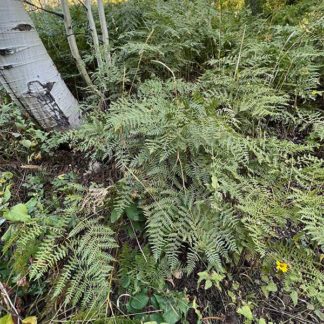
Pteridium aquilinum / common bracken
- a fern with large, triangular fronds, up to 4 ft tall
- fronds subdivided into triangular leaflets
- herbaceous perennial
- deciduous with annual regrowth first appearing as fiddleheads in spring
- wide range of habitats, including full sun
-
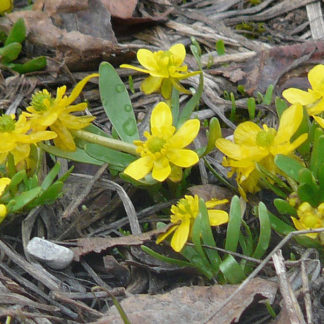
Ranunculus glaberrimus / sagebrush buttercup
- one of the earliest spring flowers
- yellow flowers, ca. 1" across
- usually 5 shiny/waxy petals, numerous stamens
- short, mostly elliptical leaves
- in small to field-sized clumps
- very poisonous
-
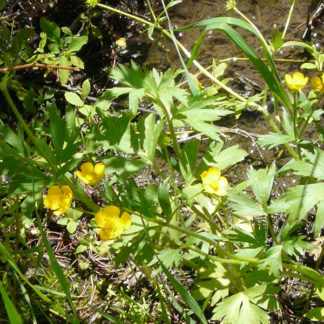
Ranunculus orthorhynchus / straightbeak buttercup
- 5 (to 8) bright, shiny yellow petals with long pedicels
- many stamens and pistils
- large, compound leaves with 3-5 pointy-lobed leaflets
- found in wet areas including irrigation ditches
-

Sambucus nigra / common elderberry
- shrub or small tree blooming in late spring
- leaves opposite
- pinnately compound with up to 9 leaflets with serrated edges
- flowers are white, 5-petaled, in flat-topped clusters of clusters
- "berries" are red or dark blue/black in August; often drooping when mature
-

Senecio integerrimus / tall western groundsel
- early spring to early summer, often with larkspur
- bright yellow flower head with several, disheveled looking blossoms
- only 5-13 ray florets (petals)
- cobwebby hairy basal leaves, especially when young
- seasonally moist areas, from sagebrush to higher parts of the fen
Showing 13–24 of 28 results